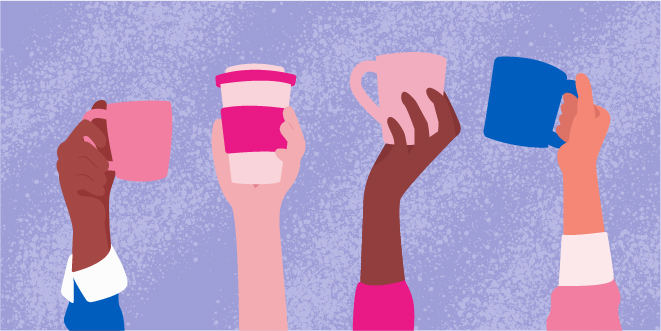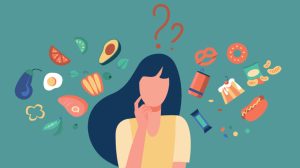Examining Your Relationship with Caffeine

Do you not feel like yourself until you’ve had your caffeine fix? Do you rely on your morning matcha to give you a much-needed mood boost?
If you answered yes to either of these questions, then it might be time to examine your relationship with caffeine.
Caffeine Isn’t “Bad”
Let’s get one thing straight – caffeine is not a bad thing. We’re certainly not anti-coffee or tea around here, we’re merely advocating for looking at how and how often you use it.
To throw caffeine a bone, it actually offers quite a few health benefits:
- Regular caffeine consumption may reduce the risk of dementia, strokes, and depression.
- May decrease the risk of depression and increase dopamine levels.
- Can increase fat burning and metabolism.
Besides the potential health benefits, for many people, caffeine is a tool that allows them to be more alert, productive, and generally in a better mood. But at what cost?
When To Cut Back on Caffeine
The thing with caffeine is that it’s all about moderation. A small amount may help boost your health and energy levels, but too much of it can throw your body off balance. Not only that, but everyone has different tolerance levels.
So how do you know when it’s time to cut back on caffeine? It might come from the nagging thought that you’re too dependent on your morning cup of liquid gold. You may be experiencing some uncomfortable side effects. Or you’re simply curious about what your life might look like without (or with less) caffeine.
Here are some signs it’s time to decrease your caffeine intake:
- You deal with chronic migraines.
- You have insomnia or difficulty sleeping.
- You have an anxiety disorder or symptoms of anxiety.
- You have gastrointestinal issues like IBS or acid reflux.
- You experience energy crashes in the afternoon.
- You depend on caffeine to be able to “get going”.
- You’re irritable without caffeine.
Another potential issue with caffeine is that often your morning beverage is loaded with extra sugar. This can add unnecessary sugar to your diet and can lead to blood sugar spikes and crashes. A fun sweet drink is fine every now and then, but drinking them daily can certainly throw you off.
How To Cut Back on Caffeine
So you’ve decided to cut back on caffeine. Don’t worry, we believe in you. Caffeine dependency is no joke, especially if you haven’t taken a break since you started drinking it.
How do you cut back on it?
Set Goals and Guidelines
Before starting, figure out what your goals are. Do you want to stop being dependent on caffeine? Do you want to see if the symptoms you’re experiencing are caffeine-related? Do you want to do it as a wellness experiment?
Figuring out your goals helps you set guidelines for your caffeine intake. Are you going to go cold turkey? For how long? Are you going to switch from coffee to green tea? Are you going to go to one cup a day instead of three? These are all guidelines that help you figure out a caffeine plan that aligns with your goals.
How You Drink Caffeine
Sometimes changing your relationship with caffeine isn’t just about whether or not you’re drinking it, but how you’re drinking it. There are a few tips you can use to help yourself become a responsible caffeine drinker.
- Know your limit, and try not to exceed that.
- Try not to drink caffeine on an empty stomach, especially if you have gastrointestinal issues.
- Some people digest coffee better when it has fat in it like milk or a milk alternative.
- Practice doing some things before having caffeine like going for a walk, meditating, or working out.
- Keep a journal during the experiment to see how you feel on different days, making sure to write if you consume any caffeine, how much, and its effects.
More Caffeine Cutting Tips
You might feel pretty drained or have a hard time focusing when you first quit caffeine. Just because you’re not drinking caffeine doesn’t mean you can’t use other tools to help keep you feeling alert and focused.
Here are some other ways to help with caffeine withdrawals:
- Try an adaptogen like maca, lion’s mane, or ginseng. You can make these into a yummy morning drink so you still get your fix.
- Get moving with a morning walk or quick workout.
- Start a different morning ritual like meditating, reading, or journaling.
- Be easy on yourself. You might not get as much done as normal.
Change Your Relationship with Caffeine
Let’s face it – caffeine is an important part of many people’s lives and one that’s not going anywhere, anytime soon. Nor should it. Caffeine isn’t inherently bad. Consuming it comes with many potential health benefits, and it makes you feel good!
You might not want to completely cut caffeine out of your life, and that’s fine – neither do we. What’s important is that you’re able to maintain a healthy relationship with it, notice any negative side effects it might be causing, and hopefully not be totally dependent on it.
That might mean decreasing your consumption (do you really need that third cup?), switching from coffee to tea, or going cold turkey for a bit. You need to figure out what works for you.








